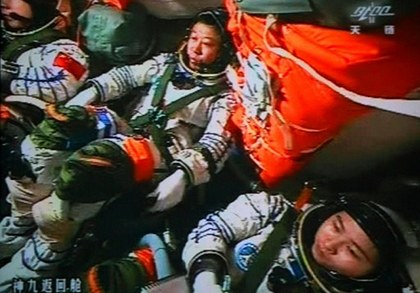SUMMARY
This is AI generated summarization, which may have errors. For context, always refer to the full article.

BEIJING, China – Three Chinese astronauts returned to Earth as heroes on Friday, June 29, after carrying out China’s most complex and longest mission in orbit, vital steps in the country’s effort to build a space station by 2020.
The 13-day voyage also saw China send a woman into space for the first time, and the nation’s leaders celebrated as soon as the crew members emerged from their cramped return capsule smiling and seemingly in good health.
“This is… another outstanding contribution by the Chinese nation to human exploration and the use of outer space,” Premier Wen Jiabao said, reading a statement representing all the top leaders.
“It has profound significance in enhancing China’s comprehensive power and inspiring the national spirit.”
The charred return capsule of the Shenzhou-9 spacecraft, which means Divine Vessel in Chinese, hit the ground in a remote area of northern China and rolled over on Friday morning after an approach slowed by a large parachute.
With the events broadcast across the nation on state-run television, the crew members spent another hour inside the capsule while medical workers checked on their conditions.
As the three were finally pulled out still wearing their white space suits, they waved, smiled and gave thumbs up signals, then made patriotic comments for the television audience.
Good spirits
“We have successfully accomplished the first manned docking mission for China and have now returned to home,” said crew leader Jing Haipeng, 45, who has been on three of the country’s four manned space missions.
“Thanks to our country, thanks to the care and love from people of all ethnic groups of the country. Thanks.”
The history-making female member of the crew, Liu Yang, a 33-year-old air force pilot, was in similarly good spirits, saying she felt “warm and comfortable” throughout the trip.
During their mission the crew successfully carried out China’s first manual space docking, an extremely difficult move that is essential in the process of building a space station — which Beijing aims to do by 2020.
The manoeuvre — completed by the Americans and Russians in the 1960s — requires two vessels orbiting Earth at thousands of kilometers (miles) per hour to come together very gently to avoid destroying each other.
It was the main goal of the mission and the team rehearsed the procedure more than 1,500 times in simulations.
Morris Jones, an Australia-based independent expert on China’s programme, said the length of the space flight — the crew spent most of the 13 days in the Tiangong-1 module — was more significant than the manual space docking.
“This is China’s longest and most complex space flight to date,” Jones said.
“The most important thing about the mission is something they haven’t said openly and it’s the fact that this Tiangong laboratory is more than just a laboratory. It is a proper space station, albeit a very small one.”
China has spent 39 billion yuan (US$6.1 billion) over the past two decades on its efforts to build a permanent manned space station, according to government figures.
The programme kicked off in 1999 with the launch of Shenzhou-1, with no crew on board.
Space walk
Two years later, Shenzhou-2 lifted off with small animals aboard, and in 2003, China sent its first man into space. Since then, it has completed a space walk in 2008 and an unmanned docking between a module and rocket last year.
China sees its space programme as a symbol of its rising global stature, growing technical expertise, and the Communist Party’s success in turning around the fortunes of the once poverty-stricken nation.
French space expert Isabelle Sourbes-Verger agreed the latest successful mission had helped cement China’s status in these areas.
“By demonstrating that they master (these procedures), China fully enters the club of big powers in human occupation (of space),” said Sourbes-Verger, from France’s National Centre for Scientific Research.
“The political objectives for the space programme — to be able to demonstrate indisputable technological and scientific competence — have been reached.” – Agence France-Presse
Add a comment
How does this make you feel?
There are no comments yet. Add your comment to start the conversation.